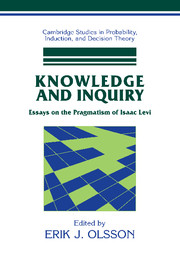Book contents
- Frontmatter
- Contents
- List of Contributors
- Preface
- Introduction: The Pragmatism of Isaac Levi
- 1 Isaac Levi and His Pragmatist Lineage
- 2 Is Pragmatist Truth Irrelevant to Inquiry?
- 3 The Knowledge Business
- 4 Infallibility and Incorrigibility
- 5 Why Inconsistency Is Not Hell: Making Room for Inconsistency in Science
- 6 Levi on Risk
- 7 Vexed Convexity
- 8 Levi's Chances
- 9 Isaac Levi's Potentially Surprising Epistemological Picture
- 10 Isaac Levi on Abduction
- 11 Potential Answers – To What Question?
- 12 Levi and the Lottery
- 13 The Value of Truth and the Value of Information: On Isaac Levi's Epistemology
- 14 Decision-Theoretic Contraction and Sequential Change
- 15 Deciding What You Know
- 16 Levi's Ideals
- 17 The Mind We do Not Change
- 18 Psychoanalysis as Technology
- 19 Levi on Money Pumps and Diachronic Dutch Books
- 20 Levi on the Reality of Dispositions
- 21 Replies
- Index
21 - Replies
Published online by Cambridge University Press: 05 March 2010
- Frontmatter
- Contents
- List of Contributors
- Preface
- Introduction: The Pragmatism of Isaac Levi
- 1 Isaac Levi and His Pragmatist Lineage
- 2 Is Pragmatist Truth Irrelevant to Inquiry?
- 3 The Knowledge Business
- 4 Infallibility and Incorrigibility
- 5 Why Inconsistency Is Not Hell: Making Room for Inconsistency in Science
- 6 Levi on Risk
- 7 Vexed Convexity
- 8 Levi's Chances
- 9 Isaac Levi's Potentially Surprising Epistemological Picture
- 10 Isaac Levi on Abduction
- 11 Potential Answers – To What Question?
- 12 Levi and the Lottery
- 13 The Value of Truth and the Value of Information: On Isaac Levi's Epistemology
- 14 Decision-Theoretic Contraction and Sequential Change
- 15 Deciding What You Know
- 16 Levi's Ideals
- 17 The Mind We do Not Change
- 18 Psychoanalysis as Technology
- 19 Levi on Money Pumps and Diachronic Dutch Books
- 20 Levi on the Reality of Dispositions
- 21 Replies
- Index
Summary
PREFACE TO MY REPLIES
I wish to express my appreciation to all the contributors to this volume for their contributions. The quality of the chapters and the distinction of the authors calls for more extended comment on what they have to say than the space allotted to me permits, and this may sometimes lead to my stating my reactions with a bluntness that disguises the gratitude, regard, and respect that I have for all of the authors. I am aware that my views are often controversial, and the authors have as a group risen admirably to the occasion by fueling the controversy.
WHAT SORT OF REALIST IS PEIRCE AFTER ALL? REPLY TO MISAK
Cheryl Misak and I share an admiration of Peirce's account of fixing belief – an account whose basic elements remained constant throughout the bulk of Peirce's career. According to that account, changing beliefs requires justification. Current beliefs do not need justification. Indeed, rational inquirers judge all their current beliefs to be true. This shared appreciation is qualified by substantial disagreement concerning how to understand Peirce's elaboration of his ideas – disagreement that is of some philosophical moment.
In “The Fixation of Belief,” Peirce wrote that “the sole object of inquiry is the settlement of opinion.” He explicitly dismissed the thesis that the aim was to settle opinion with true (i.e., error-free) belief. He did so in the context of a comparison of four different methods of relieving doubt.
- Type
- Chapter
- Information
- Knowledge and InquiryEssays on the Pragmatism of Isaac Levi, pp. 327 - 380Publisher: Cambridge University PressPrint publication year: 2006
- 1
- Cited by



